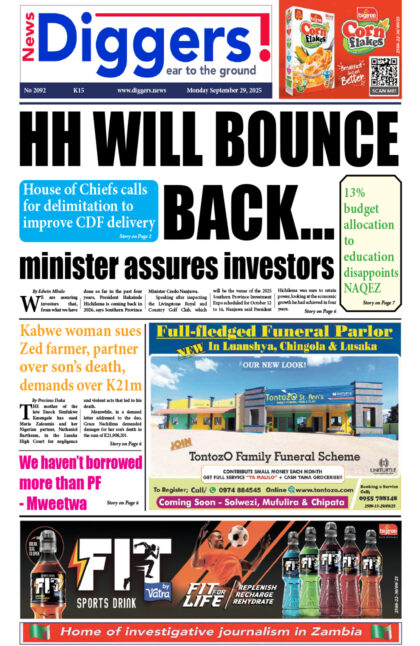Zambia’s corruption perception has worsened on the latest Transparency International Corruption Perception Index (CPI) from 87 in 2016 to 96 in 2017.
Transparency International Zambia chapter president Rueben Lifuka said out of the 180 countries surveyed in 2017, 91 countries performed better than Zambia in terms of fighting corruption.
Speaking when he launched the Transparency International 2017 Corruption Perception Index at Mika lodge in Lusaka Thursday, Lifuka said as Zambia continued to be a preferred investment destination, there was need for more radical and bold strategies to clean the public sector from corruption.
Lifuka who is also Transparency International (global) vice chairperson said the CPI was one of the tools used to measure whether or not countries were on the right track in terms of achieving the SDG targets on corruption reduction. He added that the survey was also used by investors to determine levels of the scourge in any given country before investing.
“Of the 180 countries, Zambia was ranked number 96. This means that Zambia has dropped 9 ranks from 87 in 2016. What that means is that 91 countries performed better than Zambia on the 2017 CPI. Out of a possible 100 points, Zambia scored 37. This means that Zambia has dropped one point from a score of 38 in 2016. There were six countries that scored the same as Zambia. These are Brazil, Colombia, Indonesia, Panama, Peru and Thailand. As records can show, Zambia has been scoring 38 points for 4 years from 2013 up to 2016. This means that the corruption situation has continued to be perceived as bad without any improvement. And now in 2017, the situation is evidently going from bad to worse. Zambia is slipping lower in the ranks and the score, and this should be a source of concern to all,” Lifuka said.
“There are a few key observations that we would like to make regarding the larger implications of the 2017 CPI results for our country Zambia. First and foremost, it is clear from recent CPI results that Zambia has been performing poorly over the past six years on the CPI. Over those six years, our message has been clear and consistent, as a country we need to move from political rhetoric on the fight against corruption to demonstrate action. The 2017 results are an indication that we are not doing enough to fight corruption and that corruption is on the increase. For a country which desires to continue to be a preferred investment destination, we need to have high ambitions in combating corruption. We should emphasise that we need more radical and bold strategies to clean the public sector.”
He observed that in the last three years Zambia had been engulfed in numerous corruption allegations.
“Most of us can affirm that the last two-three years have not been easy for Zambia. The number of allegations of corruption in the public sector continue to rise. This is collaborated by the reports of the Auditor General, which clearly shows weaknesses in the public sector. Some of them hinging on lack of internal control and integrity. Allegations of corruption in public procurement [which] made headlines in 2016-2017. We recall stories on the Malawi-Zambia maize scandal, the $42 million fire truck saga. In 2017 there were worrisome revelations from the Financial Intelligence Center in its trend reports. With all these issues, it should not then come as a surprise to us about our position on the CPI,” Lifuka added.
Meanwhile Lifuka revealed that the CPI for Zambia was a collection of data obtained from nine sources.
“Zambia had nine sources of data and these are the World Bank Country Policy and institutional assessment, World Economic Forum Executive Opinion survey, Bertelsmann Transformation Index, African Development Bank Country policy and Institutional Assessment, World Justice Project Rule of Law index, Political and economic Risk international, Varieties of Democracy Project, and the Economist Intelligence Unit Country Risk Assessment,” said Lifuka.























